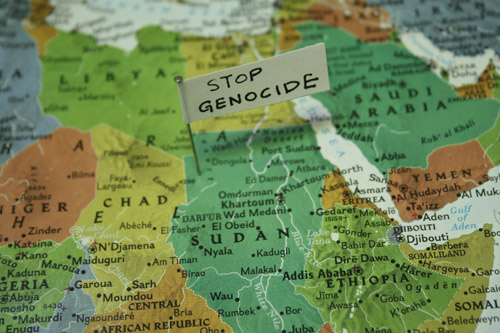“All over the world there were people like me sitting in offices, day after day after day, who did not fully appreciate the depth and the speed with which you were being engulfed by this unimaginable terror.”
Thus president Bill Clinton apologized to the people of Rwanda when Air Force One briefly landed at Kigali airport four years after the genocide there ended. Par for American presidents, the statement was not remotely true. Mr. Clinton had known exactly what was happening and chose not to intervene despite the appalling scale of the slaughter of Rwanda’s Tutsis by Hutu extremists.
But many in the Western world were indeed ignorant about the situation, which is one of the explanations later adduced for the failure of the “international community” to intervene and stop the slaughter. Most Western newspapers and TV networks either didn’t know or didn’t care about a tiny nation in Central Africa called Rwanda. For many, their negligible interest in Africa was appeased by the first free election in South Africa, which happened to take place in the same month, April, 1994, that the genocide began.
With sparse or no direct information from the media, many Western politicians understood little of the events engulfing Rwanda, and had little incentive to provide the reinforcements urged so passionately by Roméo Dallaire, the head of the puny UN military mission to Rwanda. The world stood by, hands in pocket, and passively watched.
If ignorance was the excuse, anti-genocide activists vowed that never again would such a calamity go unnoticed by the powers that be. The first test case — the “next Rwanda” — came soon enough, as the government of Sudan unleashed mass death against the Darfuri people in the west of the country in 2003. The New York Times‘ Nicholas Kristof wrote column after outraged column on his first-hand observations in Darfur. Movie stars investigated and spoke out. A worldwide grassroots campaign materialized. Thousands of Canadians added their voices.
This effort was successful, at least formally. U.S. President George W. Bush and his Secretary of State, Colin Powell, both agreed that a genocide was being organized against the people of Darfur. But somehow, that did not impact American policy. Despite the provisions of the 1948 UN Convention Against Genocide, neither the U.S. nor any other government took direct action against the government of Sudan. While attacks against the Darfuri continue to this day, and action groups persist in publicizing them, many activists were shattered to find that knowledge of the crime didn’t at all translate into action against the crime.
None of this, of course, prevented politicians around the world from continuing self-importantly to swear “Never Again” on their watch.
Now here we go again.
It is not possible that any government anywhere remains unaware of the attacks being levelled by the government of Myanmar against the country’s own Rohingya people. It is not possible that any of these governments are oblivious to the evidence that has led many prominent and responsible observers to describe these attacks as having a genocidal purpose. The indomitable Mr. Kristof is back telling Times readers “I Saw a Genocide in Slow Motion.”
Millions around the world seem to care about the fate of the Rohingya, none of them with any power to intervene. The UN’s human rights chief, Zeid Ra’ad al-Hussein, reports that Myanmar’s military have committed “acts of genocide” against the Rohingya people. Yet the UN Security Council is paralyzed, this time by China, just as it was paralyzed by Clinton’s America over Rwanda.
Thoughtful but deeply frustrated observers like Mr. Kristof and Tony Burman, the excellent Canadian foreign-affairs columnist, are pressing hard for some kind of intervention — ANY kind, almost. Mr. Burman wants Canada to get involved, and we can surely be certain that when Bob Rae — a wise and sensible man — soon hands in his report as the federal government’s special envoy for the crisis, he too will call on Canada to take action of some kind.
People look back now and try to recollect where they were during the Rwandan genocide and why they didn’t speak out while it mattered. In a few short years, they’ll be asking themselves the same thing about Myanmar. But this time, ignorance will be no excuse. We know exactly what is happening, and who is making it happen. That’s no longer the issue. The only questions are: What will we and our government do about it this time? Has Never Again actually become Again and Again?
This article originally appeared in The Globe and Mail.
Image: onthedecline/Flickr
Like this article? rabble is reader-supported journalism.




